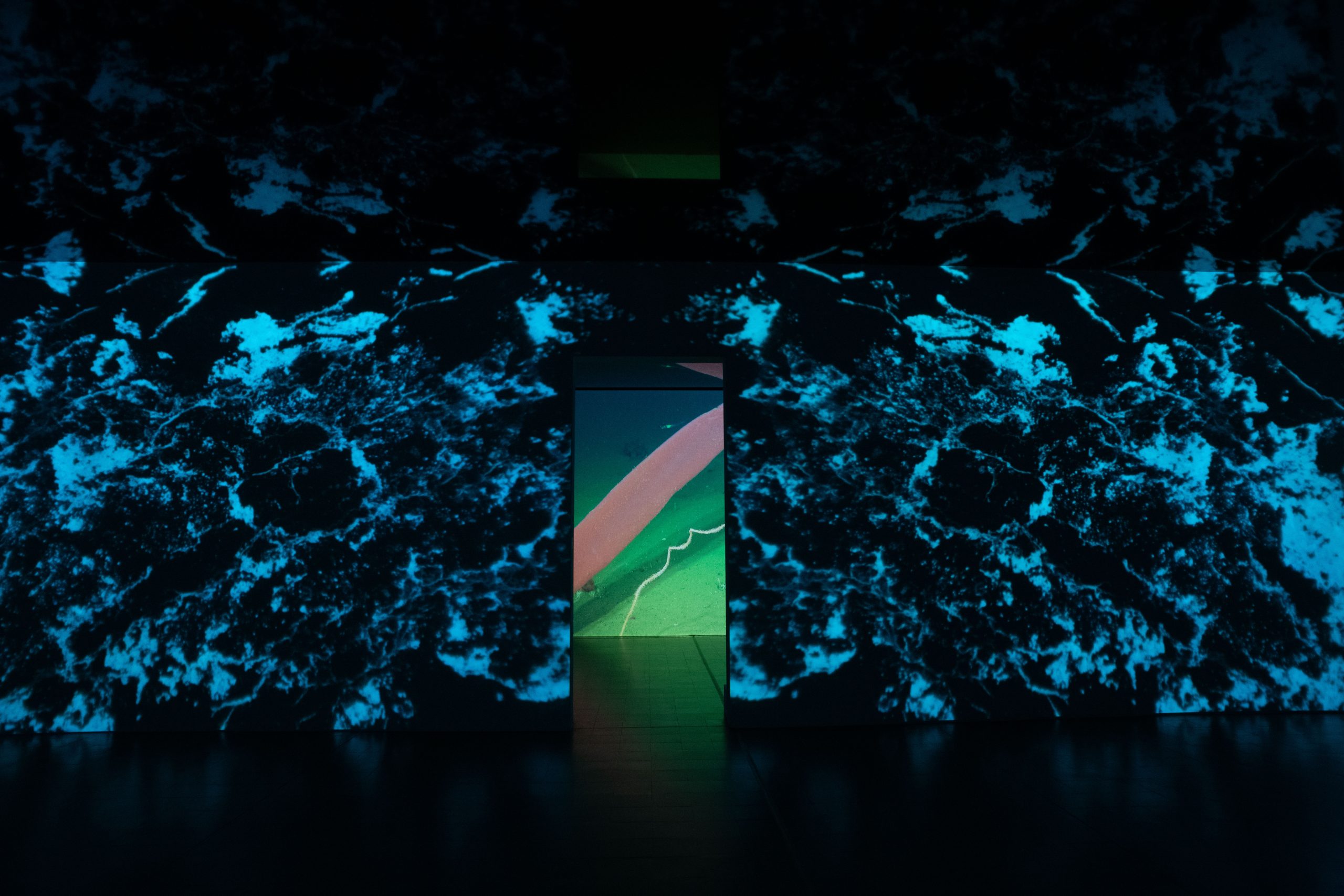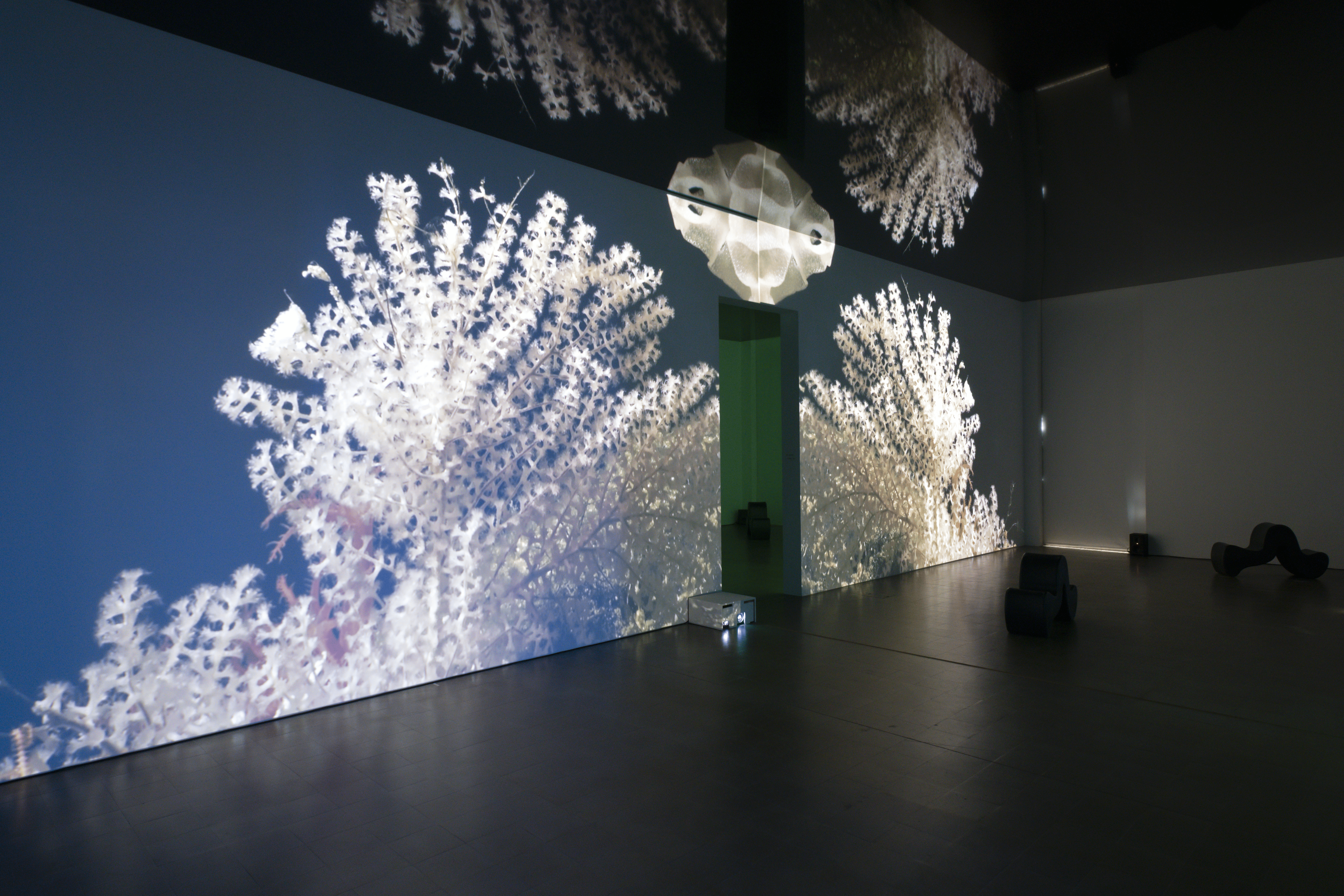
- Riparia
- Hypoxia
- Penumbra, Fondazione in Between Art Film, 2022
- Chambers of Radiance, Radvila Palace Museum of Art, 2022
- Eternal Return, Tate Modern, 2021
- t 1/2, Den Frie Centre of Contemporary Art, 2021
- Sunken Cities, Kunsthaus Pasquart, 2021
- Circular Time. For Aleksandra Kasuba, National Gallery of Art, 2021
- Chambers of Radiance, The PinchukArtCentre, 2020
- Screen City Biennial, 2019

Emilija Škarnulytė (b. Vilnius, Lithuania 1987) is an artist and filmmaker.
Working between documentary and the imaginary, Škarnulytė makes films and immersive installations exploring deep time and invisible structures, from the cosmic and geologic to the ecological and political. Her blind grandmother gently touches the weathered statue of a Soviet dictator. Neutrino detectors and particular colliders measure the cosmos with otherworldly architecture. Post-human species swim through submarine tunnels above the Arctic Circle and crawl through tectonic fault lines in the Middle Eastern desert.
Winner of the 2019 Future Generation Art Prize, Škarnulytė represented Lithuania at the XXII Triennale di Milano and was included in the Baltic Pavilion at the 2018 Venice Biennale of Architecture. With solo exhibitions at Tate Modern (2021), Kunsthaus Pasquart (2021), Den Frie (2021), National Gallery of Art in Vilnius (2021), CAC (2015) and Kunstlerhaus Bethanien (2017), she has participated in group shows at Ballroom Marfa, Seoul Museum of Art, Kadist Foundation, and the First Riga Biennial. In 2022, Škarnulytė participated in the group exhibition Penumbra organized by Fondazione In Between Art Film on the occasion of the 59th Venice Biennale. Her numerous prizes include the Kino der Kunst Project Award, Munich (2017); Spare Bank Foundation DNB Artist Award (2017), and the National Lithuanian Art Prize for Young Artists (2016)), and she was nominated as the candidate for the Ars Fennica art award 2023. She received an undergraduate degree from the Brera Academy of Art in Milan and holds a masters from the Tromsø Academy of Contemporary Art.
Her films are in the IFA, Kadist Foundation and Centre Pompidou collections and have been screened at the Serpentine Gallery, UK, Centre Pompidou, France, and the Museum of Modern Art, New York and in numerous film festivals including in Rotterdam, Busan, and Oberhausen. Most recently she concluded her tenures at Art Explora and Cite des Art, which occurred on the heels of another significant residency at the MAK Center for Art and Architecture. She is a founder and currently co-directs Polar Film Lab, a collective for analogue film practice located in Tromsø, Norway and is a member of artist duo New Mineral Collective, recently commissioned for a new work by the First Toronto Biennial.
Contact: skarnulyte.emilija@



Kunsthaus Pasquart, Biel / Bienne, Switzerland
2021 07 03 – 08 29
«Hold your breath. Drop. Dive. Open your eyes. Leave your body at the surface. You are now all eye, like a drill; all tail, like a fish. What are you trying to extract, to mine from your cool liquid entry? You pass, cool as a camera with your lens of language, through dry corridors of nuclear seas, liquid hallways of sunken cities, strange scaffolding of deep-sea mining, sculptural figures of destroyed empires. Your dry eye reaches for: Mosaics of the sea floor or mosaics of the control room; a body slithering, snakelike, over its nuclear control panels. Elsewhere, in another deep, jellyfish are loose and luminescent and labouring as flowers articulating the black. Architectures rise like language inside you, lean and lucid or marmoreal and voluptuous, each writ across the wet pages of southern bodies of water, dry pages of northern bodies of tundra. […]
Who brought you here? Some mermaid archaeologist, some modern undine, some artist-as- siren-as-museum guide. Some body as soundwave, as cognition only. What cities are sunk deep inside you? […] Mosaic, neoprene, saline, chlorophyll, oil, mineral, sex, empire, bivalves, shifting tectonic plates, shifting desires, some ancient volcanic basin. […] You are not pillaging the sunken city, though, you are swimming it. Now count before you go deeper into it: one, two, three, four, five—now go.»
Quinn Latimer on Emilija Škarnulytė’s Sunken Cities (2021)
In Škarnulytė’s films of the last few years places often appear in which contemporary political issues are negotiated, fluctuating between human and non-human worlds and erasing the boundaries between geological, ecological and cosmic powers. She touches on fundamental problems of our historic period: climate change and the future of humankind. She confronts these with the filmic exploration of varied narratives, which at the same time remain open but merge with one other. The artist takes herself on a search for truth, showing us an anthology composed of different histories. Škarnulytė’s poetic stagings leave behind a feeling of contemplative anxiety, generated by the encounter with everything that is larger than us, larger than life – a threatening climate catastrophe, natural phenomena, ideological constructions, gigantic scientific (infra)structures and human knowledge that leave indelible inscriptions and scars on the planet.
Curator Stefanie Gschwend





